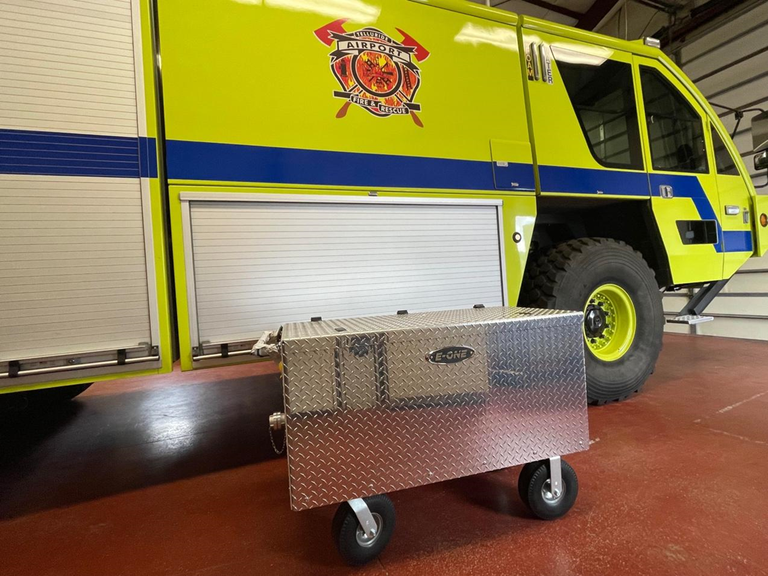Colorado Division of Aeronautics completes statewide initiative to minimize environmental impacts of toxic chemicals in firefighting foam at Colorado airports
News Release
WATKINS - In August 2019, the Colorado Aeronautical Board (CAB), which oversees the Colorado Department of Transportation’s Division of Aeronautics, approved $400,000 in state aviation funding to assist Federal Aviation Administration (FAA) certified commercial service airports in Colorado with the acquisition of equipment to minimize the environmental impact of aircraft firefighting foam containing toxic chemicals, known as per- and polyfluoroalkyl substances (PFAS).
This innovative initiative, only the second such program in the nation, was developed in collaboration with airports and the Colorado Department of Public Health and Environment (CDPHE). This effort comes amid an increasing environmental focus on PFAS chemicals, as they have been found to pose challenges to drinking water supplies. Airports certified under Federal Aviation Regulation (FAR) Part 139 are currently required by federal regulations to use PFAS-based foam, and to annually test and certify aircraft rescue firefighting equipment and the foam utilized. Under the provisions of this new statewide aviation initiative, the Colorado Division of Aeronautics provided 100% funding for the acquisition of specialized testing and containment equipment designed to allow FAA-compliant firefighting foam testing to take place without the need for regular foam discharges.
In September of 2021, this statewide initiative was completed, with all eligible Colorado airports having acquired and deployed their foam testing equipment. (Photo below of the foam testing cart at the Telluride Regional Airport). In total, 12 eligible airports participated in the program, with the exception of Denver International Airport, which already had the equipment, and Colorado Springs Airport where aircraft rescue and firefighting services are provided by the U.S. Air Force.
In developing this statewide aviation initiative, the Colorado Division of Aeronautics has established a strong partnership with the Colorado Department of Public Health and Environment (CDPHE) to support CDPHE’s efforts in mitigating PFAS chemicals statewide. “The CAB and the Aeronautics Division are proud to support CDPHE’s PFAS mitigation efforts and assist Colorado’s airports in proactively taking action to be good stewards of our environment and Colorado’s local communities,” said Aeronautics Division Director David Ulane.
Kenneth Maenpa said, "as Chair of the Colorado Aeronautical Board, and manager of the Telluride Regional Airport (TEX) I am delighted that TEX is one of the airports that has participated in the Division's initiative to eliminate the need to put harmful PFAS agents into the environment while meeting FAA testing requirements. This equipment is a remarkable tool for ensuring our aircraft rescue and firefighting equipment meets FAA standards while also helping us protect our environment.”
“A top priority for breaking the chain of exposure to these toxic chemicals is preventing further contamination. We applaud the Colorado Division of Aeronautics for successfully completing this innovative solution to help our airports move more quickly to meet federal requirements while protecting our communities and environment from additional harm caused by long-term exposure to these chemicals,” said Jill Hunsaker Ryan, Executive Director, Colorado Department of Public Health and Environment.
This mission of the Colorado Division of Aeronautics is to support Colorado's multi-modal transportation system by advancing a safe, efficient, and effective statewide aviation system through collaboration, investment and advocacy.
CDPHE’s mission is to advance Colorado’s health and protect the places where we live, learn, work, and play.
More information can be found at Colorado-Aeronautics.org

Aircraft Rescue Firefighting (ARFF) foam testing cart shown in front of the Telluride Regional Airport’s ARFF truck.
